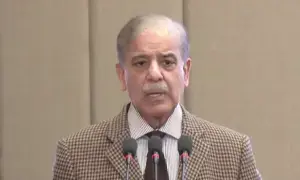US Court to hear Aafia's lawyers appeal against sentence
 A three judge panel of the US Court of Appeals is set to hear an appeal by Dr Aafia Siddiqui’s lawyers, against her September 2010 conviction on charges for attempting to kill American intelligence officers in Afghanistan in 2008.
A three judge panel of the US Court of Appeals is set to hear an appeal by Dr Aafia Siddiqui’s lawyers, against her September 2010 conviction on charges for attempting to kill American intelligence officers in Afghanistan in 2008.
On February 9, her counsel, Dawn Cardi, will present her argument before the panel to overturn the judgement against her client, while the prosecution will seek dismissal of the appeal.
Dr Siddiqui, a Pakistani neuroscientist, was sentenced to 86 years in prison by the Federal District Court in New York City, while she has consistently denied the charges levelled against her, pleading her innocence.
On April 2011, her lawyers had filed an appeal. Her court-appointed lawyer Cardi says the ‘multifaceted’ appeal will challenge the “court’s decision, the several legal issues with the trial, the introduction of evidence as well as how Siddiqui was allowed to testify given what we believe was her diminished capacity.â€
However less than a month after the sentencing, Siddiqui fired her lawyers and waived her right to an appeal. Siddiqui wrote that she had fired her five lawyers and would be represented by Farha Ahmed, a Texas-based attorney.
Cardi had said that she had been in touch with Siddiqui’s family through a representative. When asked if they were supportive of the appeal, she said, “I don’t know nor do I care. It is my responsibility and I am obligated to file an appeal.â€
Recently, there were reports that Pakistan’s Ambassador to the US Sherry Rehman met with Tina Foster, Dr Siddiqui’s lawyer from International Justice Network.
Foster had apprised the ambassador of her client’s situation and discussed with her various options to ease Aafia’s conditions of incarceration, and in the long term, her repatriation to Pakistan.
Arrested in July 2008 in Ghazni, Afghanistan, on allegations of being an al Qaeda operative and facilitator, Siddiqui was flown to New York where she was kept in a high security prison.
The neuroscientist’s case, who is a graduate of Massachusetts Institute of Technology and Brandeis University, has garnered global attention, particularly Pakistan, where protests demanding her release and repatriation to the country are held regularly by political and religious parties.
Human Rights groups have also conducted campaigns demanding her release or a lenient sentence.
















Comments are closed on this story.